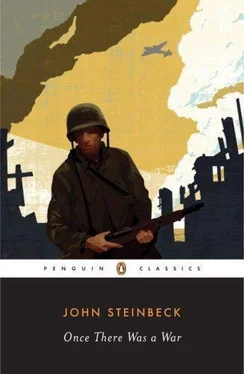John Steinbeck - Once there was a war
Здесь есть возможность читать онлайн «John Steinbeck - Once there was a war» весь текст электронной книги совершенно бесплатно (целиком полную версию без сокращений). В некоторых случаях можно слушать аудио, скачать через торрент в формате fb2 и присутствует краткое содержание. Город: New York, Год выпуска: 1960, Издательство: Bantam Books, Жанр: Классическая проза, на английском языке. Описание произведения, (предисловие) а так же отзывы посетителей доступны на портале библиотеки ЛибКат.
- Название:Once there was a war
- Автор:
- Издательство:Bantam Books
- Жанр:
- Год:1960
- Город:New York
- ISBN:нет данных
- Рейтинг книги:3 / 5. Голосов: 1
-
Избранное:Добавить в избранное
- Отзывы:
-
Ваша оценка:
- 60
- 1
- 2
- 3
- 4
- 5
Once there was a war: краткое содержание, описание и аннотация
Предлагаем к чтению аннотацию, описание, краткое содержание или предисловие (зависит от того, что написал сам автор книги «Once there was a war»). Если вы не нашли необходимую информацию о книге — напишите в комментариях, мы постараемся отыскать её.
Once there was a war — читать онлайн бесплатно полную книгу (весь текст) целиком
Ниже представлен текст книги, разбитый по страницам. Система сохранения места последней прочитанной страницы, позволяет с удобством читать онлайн бесплатно книгу «Once there was a war», без необходимости каждый раз заново искать на чём Вы остановились. Поставьте закладку, и сможете в любой момент перейти на страницу, на которой закончили чтение.
Интервал:
Закладка:
The battalion of men who are moving half-tracks from one place to another, doing a job that gets no headlines, no public notice, and yet which must be done if there is to be a victory, are forgotten, and they feel forgotten. But Bob Hope is in the country. Will he come to them, or won’t he? And then one day they get a notice that he is coming. Then they feel remembered. This man in some way has become that kind of bridge. It goes beyond how funny he can be or how well Frances Langford sings. It has been interesting to see how he has become a symbol.
This writer, not knowing Hope, can only conjecture what goes on inside the man. He has seen horrible things and has survived them with good humor and made them more bearable, but that doesn’t happen without putting a wound on a man. He is cut off from rest, and even from admitting weariness. Having become a symbol, he must lead a symbol life.
Probably the most difficult, the most tearing thing of all, is to be funny in a hospital. The long, low buildings are dispersed in case they should be attacked. Working in the gardens, or reading in the lounge rooms are the ambulatory cases in maroon bathrobes. But in the wards, in the long aisles of pain the men he, with eyes turned inward on themselves, and on their people. Some are convalescing with all the pain and itch of convalescence. Some work their fingers slowly, and some cling to the little trapezes which help them to move in bed.
The immaculate nurses move silently in the aisles at the foot of the beds. The time hangs very long. Letters, even if they came every day, would seem weeks apart. Everything that can be done is done, but medicine cannot get at the lonesomeness and the weakness of men who have been strong. And nursing cannot shorten one single endless day in a hospital bed. And Bob Hope and his company must come into this quiet, inward, lonesome place, and gently pull the minds outward and catch the interest, and finally bring laughter up out of the black water. There is a job. It hurts many of the men to laugh, hurts knitting bones, strains at sutured incisions, and yet the laughter is a great medicine.
This story is told in one of those nameless hospitals which must be kept safe from bombs. Hope and company had worked and gradually they got the leaden eyes to sparkling, had planted and nurtured and coaxed laughter to life. A gunner, who had a stomach wound, was gasping softly with laughter. A railroad casualty slapped the cast on his left hand with his right hand by way of applause. And once the laughter was alive, the men laughed before the punch line and it had to be repeated so they could laugh again.
Finally it came time for Frances Langford to sing. The men asked for “As Time Goes By.” She stood up beside the little GI piano and started to sing. Her voice is a little hoarse and strained. She has been working too hard and too long. She got through eight bars and was into the bridge, when a boy with a head wound began to cry. She stopped, and then went on, but her voice wouldn’t work any more, and she finished the song whispering and then she walked out, so no one could see her, and broke down. The ward was quiet and no one applauded. And then Hope walked into the aisle between the beds and he said seriously, “Fellows, the folks at home are having a terrible time about eggs. They can’t get any powdered eggs at all. They’ve got to use the old-fashioned kind that you break open.”
There’s a man for you — there is really a man.
A COZY CASTLE
LONDON, July 27, 1943 —
The jeep turns off the main road and pulls to a stop. The great gate of gray stone arches over the driveway. When it was built America was a wilderness with a few colonies clinging passionately to its edges. From the stone sentry room an American sentry emerges and stands by the jeep. He looks at passes. He salutes and opens a huge iron gate.
The jeep moves on into an ascending driveway overarched with oaks and beeches six feet through the trunks. The road curves and climbs a little hill and ahead you can see a gray tower poking above the enormous trees. Then you come out of the neat, ancient forest and there is a perfect castle against a hill, with lawns in front of it. It is a little castle, only about forty rooms, a cottage for its period. And it was built by a certain English king for a certain English mistress.
It is odd that this ancient scandal must not be identified but it is so. If, for instance, it were known which king and which mistress were involved in the building of the little castle, then it would be known by the enemy which castle it is and if, further, it were known that American troops are quartered in this castle, it would become a target for enemy aircraft. But since a wholesome number of English kings had mistresses and built little castles for them, so much information does not give the enemy a target or rather it gives him a number of targets too great to concentrate on.
On the lawn in front of the castle, where once perhaps gentlemen in heavy armor challenged one another with spears, a platoon of American soldiers, helmeted and with full packs, are doing close-order drill, marching, countermarching, opening and closing ranks, their bayonets gleam-in the summer English sunshine.
In the gardens leading to the pointed door the roses are blooming. Red roses and white roses. Great-grand-children of the bushes from which perhaps the symbols of Lancaster and York were picked and worn as insignia in the Civil War. The stones of the entrance are deeply worn, concave as basins, and beyond is a dark hall, so high and shadow-deep in the midday that you must get your eyes used to it before you can see the carved oaken ceiling from which thousands of little oak faces look out. And in this great hall an American Army sergeant sits behind a pine table and does his work.
Beyond, through an open door, is an even larger room but this one is lighter, for one side of it has large leaded windows, constructed in diamonds and lozenges and circles and moons of glass. And this also looks on the rose garden, the lawn, and finally to the forest.
There is a great fireplace in this room, a fireplace so high that a tall man can walk inside without stooping and could lie down without scrunching. The mantel over the fireplace is deep with heraldic carving. This is the lounge. On chairs procured somewhere the GIs sit and read and listen to the radio. A fine bar has been built against one wall, where Coca-Cola and pop are sold. And overhead, the arching roof of carved oak, chiseled and fitted long before America was born. And a soldier leaning back in his chair is staring fascinated at the ceiling. There is a copy of Yank in his lap. He squints his eyes and studies the ceiling. He withdraws his attention and calls, “Hey, Walter, have the Dodgers got twenty-four or twenty-five games?”
Up the broad stairway is a gallery and then the thirty rooms or so in which the guests of the couple were made comfortable, for it is probable that only five or six hundred people knew about this old scandal, including the lady’s husband. The rooms are large, and each one has its carved fireplace and its little leaded, diamond-paned window, looking dimly on the gardens. But the rooms themselves are squad rooms with the cots arranged in a line, the shoes at attention underneath, the lockers with drawn-up blouses and trousers and towels and the helmets squarely on top. The rooms are probably much cleaner than they were when the king’s mistress lived there.
Downstairs in a kind of cave is the kitchen, where an Army cook is baking square apple pies by the quarter-acre. The floor is so deeply worn that he has to step over some of the high places. His coal stove is roaring, and he has arrived at that quiet hopelessness that cooks get on finally realizing that their work is never going to be finished, that there is no way of feeding a man once for all.
Читать дальшеИнтервал:
Закладка:
Похожие книги на «Once there was a war»
Представляем Вашему вниманию похожие книги на «Once there was a war» списком для выбора. Мы отобрали схожую по названию и смыслу литературу в надежде предоставить читателям больше вариантов отыскать новые, интересные, ещё непрочитанные произведения.
Обсуждение, отзывы о книге «Once there was a war» и просто собственные мнения читателей. Оставьте ваши комментарии, напишите, что Вы думаете о произведении, его смысле или главных героях. Укажите что конкретно понравилось, а что нет, и почему Вы так считаете.









